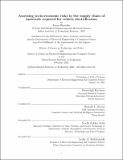| dc.contributor.advisor | Randolph Kirchain. | en_US |
| dc.contributor.author | Bhuwalka, Karan. | en_US |
| dc.contributor.other | Massachusetts Institute of Technology. Institute for Data, Systems, and Society. | en_US |
| dc.contributor.other | Technology and Policy Program. | en_US |
| dc.contributor.other | Massachusetts Institute of Technology. Department of Electrical Engineering and Computer Science. | en_US |
| dc.date.accessioned | 2021-06-17T17:21:20Z | |
| dc.date.available | 2021-06-17T17:21:20Z | |
| dc.date.copyright | 2021 | en_US |
| dc.date.issued | 2021 | en_US |
| dc.identifier.uri | https://hdl.handle.net/1721.1/131008 | |
| dc.description | Thesis: S.M. in Technology and Policy, Massachusetts Institute of Technology, School of Engineering, Institute for Data, Systems, and Society, Technology and Policy Program, February, 2021 | en_US |
| dc.description | Thesis: S.M., Massachusetts Institute of Technology, Department of Electrical Engineering and Computer Science, February, 2021 | en_US |
| dc.description | Cataloged from the official PDF of thesis. | en_US |
| dc.description | Includes bibliographical references (pages 63-69). | en_US |
| dc.description.abstract | Modern automobiles are composed of more than 2000 different compounds comprising at least 76 different elements. Identifying supply risks across this range of materials is important to ensure a smooth transition to renewable-energy based transportation technologies. This thesis provides insight into how electrification of vehicles is changing their material composition and how that change drives supply risk vulnerability. To make these contributions, we analyze part-level data of material use for seven current year models, ranging from internal combustion engine vehicles (ICEVs) to plug-in hybrid vehicles (PHEVs). The dataset is one of the most detailed ones analyzed in academic literature with almost 360,000 records of material composition of parts. We provide a comprehensive, high resolution (elemental and compound level) snapshot of materials use in both conventional and hybrid electric vehicles. We propose and apply a metric of vulnerability and find that the vulnerability to supply risks doubles as fleets shift from conventional to hybrid. We analyze three socio-political risks in the materials supply chain that are of concern to manufacturers and policymakers: a) the risk of supply concentration, b) the risk of conflict in the supply chain and c) the risk of modern slavery in the supply chain. We find that the prevalence of all these risks increases as fleets electrify. The fact that both the cost of supply chain disruptions (vulnerability) as well as the likelihood of disruptions (supply risk) increases is concerning for manufacturers and policymakers. Stakeholders should identify strategies to minimize risks in the supply chain such as material substitution, supply chain diversification and responsible sourcing of materials. | en_US |
| dc.description.statementofresponsibility | by Karan Bhuwalka. | en_US |
| dc.format.extent | 69 pages | en_US |
| dc.language.iso | eng | en_US |
| dc.publisher | Massachusetts Institute of Technology | en_US |
| dc.rights | MIT theses may be protected by copyright. Please reuse MIT thesis content according to the MIT Libraries Permissions Policy, which is available through the URL provided. | en_US |
| dc.rights.uri | http://dspace.mit.edu/handle/1721.1/7582 | en_US |
| dc.subject | Institute for Data, Systems, and Society. | en_US |
| dc.subject | Technology and Policy Program. | en_US |
| dc.subject | Electrical Engineering and Computer Science. | en_US |
| dc.title | Assessing socio-economic risks in the supply chain of materials required for vehicle electrification | en_US |
| dc.type | Thesis | en_US |
| dc.description.degree | S.M. in Technology and Policy | en_US |
| dc.description.degree | S.M. | en_US |
| dc.contributor.department | Massachusetts Institute of Technology. Institute for Data, Systems, and Society | en_US |
| dc.contributor.department | Technology and Policy Program | en_US |
| dc.contributor.department | Massachusetts Institute of Technology. Department of Electrical Engineering and Computer Science | en_US |
| dc.contributor.department | Massachusetts Institute of Technology. Engineering Systems Division | |
| dc.identifier.oclc | 1256450508 | en_US |
| dc.description.collection | S.M.inTechnologyandPolicy Massachusetts Institute of Technology, School of Engineering, Institute for Data, Systems, and Society, Technology and Policy Program | en_US |
| dc.description.collection | S.M. Massachusetts Institute of Technology, Department of Electrical Engineering and Computer Science | en_US |
| dspace.imported | 2021-06-17T17:21:20Z | en_US |
| mit.thesis.degree | Master | en_US |
| mit.thesis.department | TPP | en_US |
| mit.thesis.department | ESD | en_US |
| mit.thesis.department | IDSS | en_US |
| mit.thesis.department | EECS | en_US |
